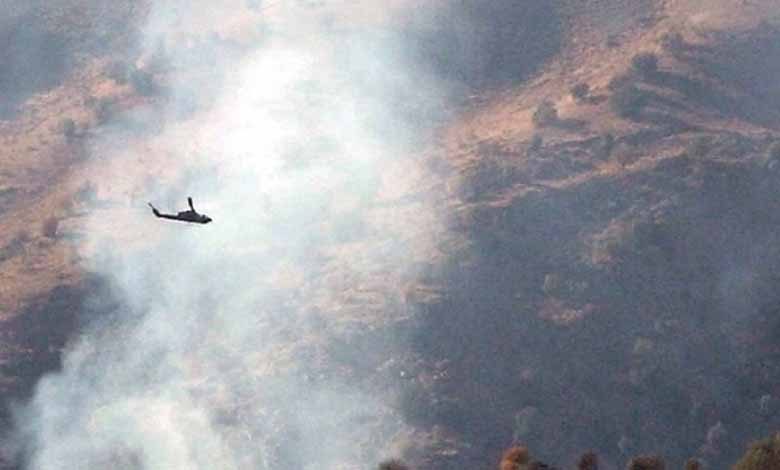Outdoor people… We survived the bombing of Turkey in northern Iraq

“The shrapnel is on our houses, our windows and our furniture are broken in fear for our souls, we are displaced.” An Iraqi farmer summed up Turkey’s shelling of the north.
The shelling has sped away nothing but a neighborhood, and has cut off the livelihoods of the residents of the northern Iraqi provinces under the pretext of pursuing the Kurdistan Workers’ Party, Turkey’s enemy, and its goal justifying the means, even if it is destroying the homes of the innocent and safe residents.
Yuhanna Khoshafa, the mayor of a border village in the Iraqi Kurdistan province of Dohuk, told AFP by telephone that he and his 120 compatriots had left for a nearby area to escape Turkish shelling.
Thousands displaced
John also took with him his sheep herd of two hundred heads, which he left shortly after the start of Turkey’s military operation “Lightning Claw” on 23 April in Dohuk.
The Yuhanna family is among 300 families from the Amadiya villages that were displaced under the flames of Turkish shelling. The Iraqi Ministry of Migration’s statistics, which confirmed last Thursday that about 1500 people have been displaced from their homes since the start of the last operation, show that they have lost their homes.
But others have been displaced before; He has been aiming to return home for three years; Barqi Islam, who left his village of Sinji in Shiladze after their farm was bombed and his brother killed in 2017, was one of the Turkish operations against the Kurdistan Workers’ Party since 1992.
“But the prospect of return has diminished as farmland has been burned by constant shelling and the Kurdish or Iraqi government has been unable to pay compensation.”
A witness from Erdoğan’s People
Aykan Erdemir, Turkey Program Director at the Center for the Defense of Democracy Studies and former Turkish MP for the opposition Republican People’s Party, explains how Turkish President Recep Tayyip Erdogan has taken the fight to northern Iraq.
The Turkish politician says that Erdoğan wants to move the confrontation with the Kurdistan Workers’ Party from Turkey to Kurdistan Workers’ Party controlled territory in Iraq or from there to Turkey.
“Turkey has been using drones, also arriving in the Sinjar area south of Dohuk, close to the Syrian border, in its offensive against the group, which has been waging an insurgency since 1984, preventing thousands of Yazidis displaced by IS practices between 2014 and 2017 from returning home.”
Since April, four civilians have been injured in Dohuk and three have been killed by shelling on a refugee camp outside the Kurdistan region.
Stubbornness without deterrence
Following the shelling of the Makhmour camp, Turkish Defense Minister Hulusi Akar said in a defiant stance: “The Baghdad administration says it will clean up the area… We say OK. “However, we will continue our struggle until the last terrorist is controlled.”
Akar follows Erdoğan for deliberately violating Iraq’s sovereignty; After the operation against the Makhmour camp began, Turkey’s president himself pledged to “completely end the terrorist threat…along our southern border,” he said.
“For nearly two months now, Erdoğan’s defense minister has made an unannounced visit to a Turkish military base in northern Iraq, dozens of which, in addition to observation points, are adjacent to border villages”.
Environmental crime
Baghdad has summoned the Turkish ambassador more than once to protest, but the operations have not stopped and caused the burning of nearly 20 square kilometers of forests in Dohuk, according to a statement by the Department of Forests and Grazing Lands in the province. This amounts to about 2,5% of the forest area in Iraq.
Iraqi President Barham Saleh described the move as “inhuman practices and environmental crime”.
“The Turkish army penetrated into this last attack to a depth of 10 kilometers in some areas, 15 kilometers and 20 kilometers in others,” AFP quoted Rivink Mohammed, a member of the Kurdistan parliament and a resident of the border villages in Amadiya, as saying.
Mode change
Ali Saleh, an opposition MP in the Kurdistan Parliament, explains the evolution of the Turkish incursion into Iraq: “Prior to this attack, Turkish forces were entering the territory from official gates,” but since the offensive began, “Turkish forces have been establishing roads and corridors to enter directly into the territory without going through internationally recognized roads.”












